How to deploy java web in cloud server
1. Preparation
1. Register an account
After the download is completed. You can go here to apply for a 15-day free trial of the 1GB cloud server ECS and a 30-day free trial of the cloud database RDS 5G.
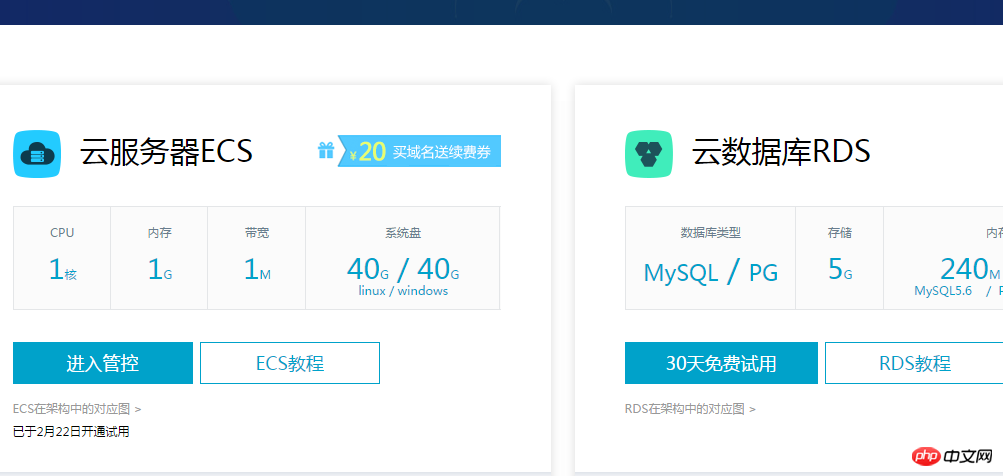
2. Download putty and FileZlilla
The process of local remote SSH login to the personal Alibaba Cloud server is very simple, so I won’t go into details here
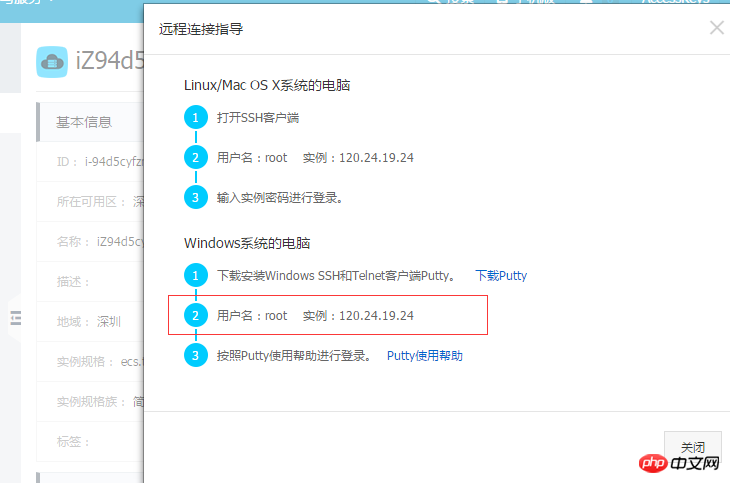
2. JDK installation
1. First download the JDK. After downloading it, upload the compressed package to the personal cloud server through FileZlilla
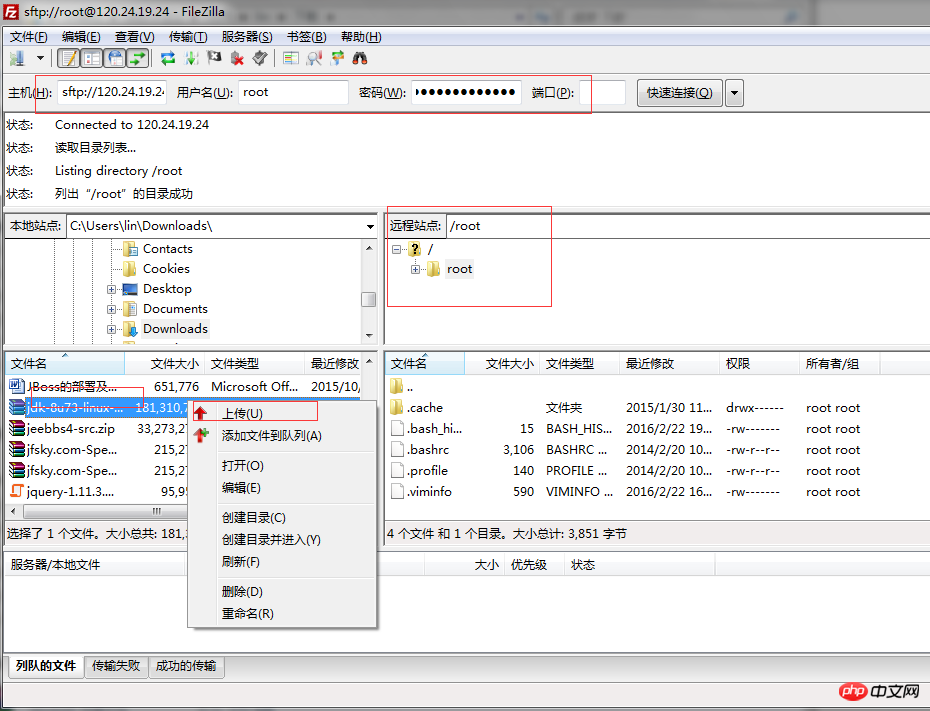
Open putty. Enter the IP address and follow the prompts to enter the username and password. (The password is the password you use to log in to the Alibaba Cloud homepage)
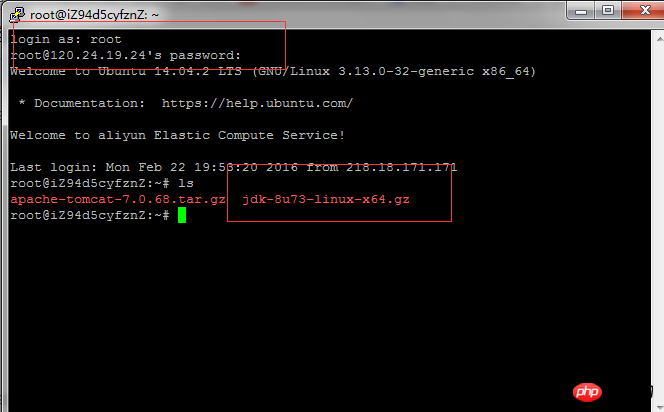
(tomcat is what will be installed in the next step)
Okay, then it will be It's very simple.
2. Configuration directory
Note: It is best to operate as root user
Create a new directory first:
cd usr
mkdir java
cd java
mkdir jdk
Then unzip the jdk tar file to the directory above:
- ##tar zxvf jdk-8u73-linux-x64.gz -C /usr/java/jdk
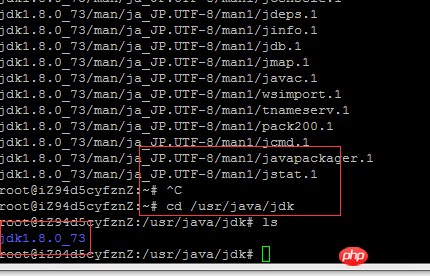
- vi /etc/profile
or
- export JAVA_HOME=/usr/java/jdk/jdk1.8.0_73
- export JRE_HOME=/usr/java/jdk/jdk1.8.0_73/jre
##export CLASSPATH=.:$JAVA_HOME/lib:$JRE_HOME/lib:$CLASSPATH
export PATH=$JAVA_HOME/bin:$JRE_HOME/bin:$JAVA_HOME:$PATH
- Note that this should be changed to The corresponding jdk directory must be modified as the root user, otherwise it cannot be saved
Execute after saving:
[plain]
Verify installation:
[plain]
view plain copy-
The following appears, indicating that the installation is successful
3. Configure tomcat
1. Download tomcat, go to download, here the author uses It is tomcat7. At the same time, download tomcat to the local computer and upload the compressed package to the personal cloud server through FileZlilla.

This is after the upload is successful:

2. Installation
Here I install tomcat into /usr/java/tomcat.
Execute
3. Configure the environment Enter the bin folder of tomcat above:tar zxvf apache-tomcat-7.0.68.tar.gz -C /usr/java/tomcat
- ##
Pay attention to the tomcat directory in advance Created

##Open
- vi setclasspath.sh
##gedit setclasspath.sh##[plain]- Add the following content:
view plain copySave it.export JRE_HOME=/usr/java/jdk/jdk1.8.0_65/jre

Then return to the bin directory:
Execute:
[plain ]view plain copy- appears as follows , indicating that the installation is successful
After confirmation, add port 8080 to access: Or directly access externally through the port, first check the external IP of your server
Or directly access externally through the port, first check the external IP of your server
 4. Upload java web from local Project
4. Upload java web from local Project 1. War package upload
This is a locally packaged war package.
Here I directly use the previously packaged war package war package, open FileZilla, and then select
2, then open the browser and enter . Note that the personal cloud server must choose the correct address, otherwise you have to cp here. Remember to put the war package under webapps under tomcat
. Note that the personal cloud server must choose the correct address, otherwise you have to cp here. Remember to put the war package under webapps under tomcat  http://120.24.19.24:8080 /JavaHelloWorld-0.0.1-SNAPSHOT/
http://120.24.19.24:8080 /JavaHelloWorld-0.0.1-SNAPSHOT/Found that it can be accessed!
Of course, you can also go to the cloud server to view the war package:
Instance access to this article: http:// 120.24.19.24:8080/JavaHelloWorld-0.0.1-SNAPSHOT/ (will no longer be accessible until 2016.3.9)
The above is the detailed content of How to deploy java web in cloud server. For more information, please follow other related articles on the PHP Chinese website!

Hot AI Tools

Undresser.AI Undress
AI-powered app for creating realistic nude photos

AI Clothes Remover
Online AI tool for removing clothes from photos.

Undress AI Tool
Undress images for free

Clothoff.io
AI clothes remover

Video Face Swap
Swap faces in any video effortlessly with our completely free AI face swap tool!

Hot Article

Hot Tools

Notepad++7.3.1
Easy-to-use and free code editor

SublimeText3 Chinese version
Chinese version, very easy to use

Zend Studio 13.0.1
Powerful PHP integrated development environment

Dreamweaver CS6
Visual web development tools

SublimeText3 Mac version
God-level code editing software (SublimeText3)

Hot Topics
 Java Spring Interview Questions
Aug 30, 2024 pm 04:29 PM
Java Spring Interview Questions
Aug 30, 2024 pm 04:29 PM
In this article, we have kept the most asked Java Spring Interview Questions with their detailed answers. So that you can crack the interview.
 Break or return from Java 8 stream forEach?
Feb 07, 2025 pm 12:09 PM
Break or return from Java 8 stream forEach?
Feb 07, 2025 pm 12:09 PM
Java 8 introduces the Stream API, providing a powerful and expressive way to process data collections. However, a common question when using Stream is: How to break or return from a forEach operation? Traditional loops allow for early interruption or return, but Stream's forEach method does not directly support this method. This article will explain the reasons and explore alternative methods for implementing premature termination in Stream processing systems. Further reading: Java Stream API improvements Understand Stream forEach The forEach method is a terminal operation that performs one operation on each element in the Stream. Its design intention is
 TimeStamp to Date in Java
Aug 30, 2024 pm 04:28 PM
TimeStamp to Date in Java
Aug 30, 2024 pm 04:28 PM
Guide to TimeStamp to Date in Java. Here we also discuss the introduction and how to convert timestamp to date in java along with examples.
 PHP: A Key Language for Web Development
Apr 13, 2025 am 12:08 AM
PHP: A Key Language for Web Development
Apr 13, 2025 am 12:08 AM
PHP is a scripting language widely used on the server side, especially suitable for web development. 1.PHP can embed HTML, process HTTP requests and responses, and supports a variety of databases. 2.PHP is used to generate dynamic web content, process form data, access databases, etc., with strong community support and open source resources. 3. PHP is an interpreted language, and the execution process includes lexical analysis, grammatical analysis, compilation and execution. 4.PHP can be combined with MySQL for advanced applications such as user registration systems. 5. When debugging PHP, you can use functions such as error_reporting() and var_dump(). 6. Optimize PHP code to use caching mechanisms, optimize database queries and use built-in functions. 7
 Java Program to Find the Volume of Capsule
Feb 07, 2025 am 11:37 AM
Java Program to Find the Volume of Capsule
Feb 07, 2025 am 11:37 AM
Capsules are three-dimensional geometric figures, composed of a cylinder and a hemisphere at both ends. The volume of the capsule can be calculated by adding the volume of the cylinder and the volume of the hemisphere at both ends. This tutorial will discuss how to calculate the volume of a given capsule in Java using different methods. Capsule volume formula The formula for capsule volume is as follows: Capsule volume = Cylindrical volume Volume Two hemisphere volume in, r: The radius of the hemisphere. h: The height of the cylinder (excluding the hemisphere). Example 1 enter Radius = 5 units Height = 10 units Output Volume = 1570.8 cubic units explain Calculate volume using formula: Volume = π × r2 × h (4
 PHP vs. Python: Understanding the Differences
Apr 11, 2025 am 12:15 AM
PHP vs. Python: Understanding the Differences
Apr 11, 2025 am 12:15 AM
PHP and Python each have their own advantages, and the choice should be based on project requirements. 1.PHP is suitable for web development, with simple syntax and high execution efficiency. 2. Python is suitable for data science and machine learning, with concise syntax and rich libraries.
 Create the Future: Java Programming for Absolute Beginners
Oct 13, 2024 pm 01:32 PM
Create the Future: Java Programming for Absolute Beginners
Oct 13, 2024 pm 01:32 PM
Java is a popular programming language that can be learned by both beginners and experienced developers. This tutorial starts with basic concepts and progresses through advanced topics. After installing the Java Development Kit, you can practice programming by creating a simple "Hello, World!" program. After you understand the code, use the command prompt to compile and run the program, and "Hello, World!" will be output on the console. Learning Java starts your programming journey, and as your mastery deepens, you can create more complex applications.
 How to Run Your First Spring Boot Application in Spring Tool Suite?
Feb 07, 2025 pm 12:11 PM
How to Run Your First Spring Boot Application in Spring Tool Suite?
Feb 07, 2025 pm 12:11 PM
Spring Boot simplifies the creation of robust, scalable, and production-ready Java applications, revolutionizing Java development. Its "convention over configuration" approach, inherent to the Spring ecosystem, minimizes manual setup, allo





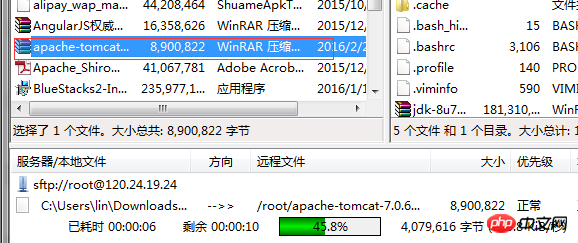




 Or directly access externally through the port, first check the external IP of your server
Or directly access externally through the port, first check the external IP of your server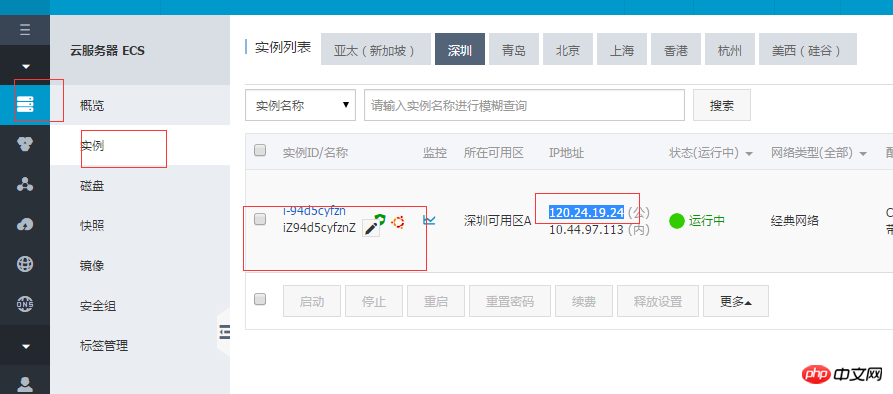
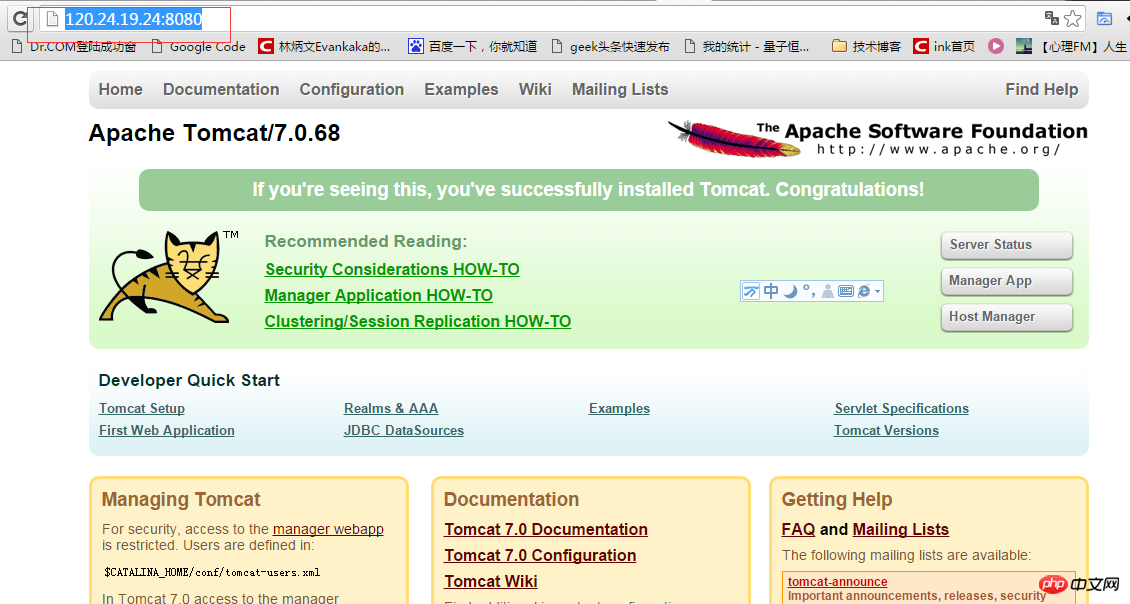 4. Upload java web from local Project
4. Upload java web from local Project 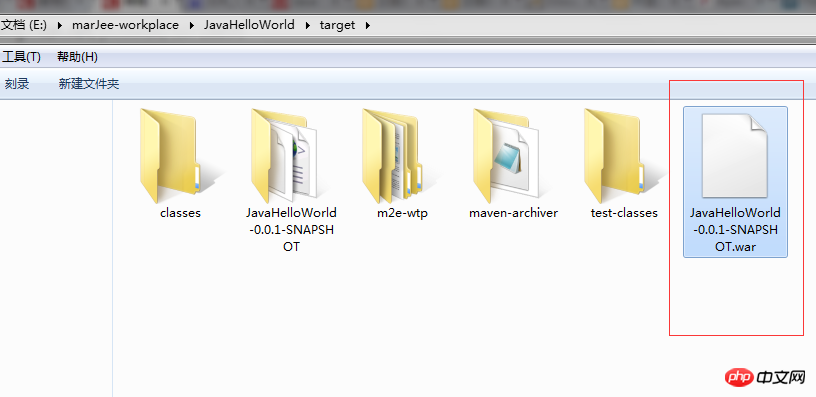 . Note that the personal cloud server must choose the correct address, otherwise you have to cp here. Remember to put the war package under webapps under tomcat
. Note that the personal cloud server must choose the correct address, otherwise you have to cp here. Remember to put the war package under webapps under tomcat 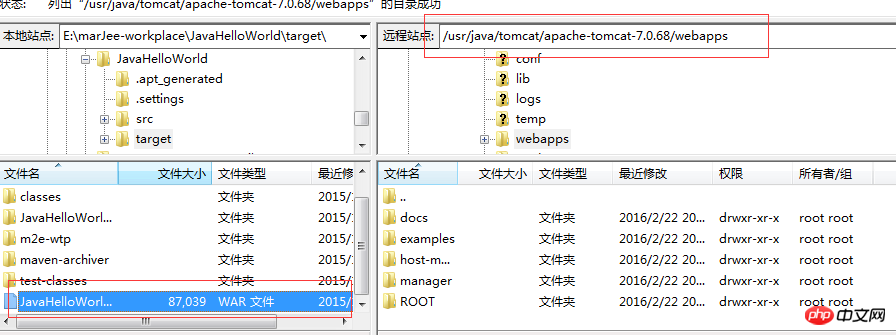 http://120.24.19.24:8080 /JavaHelloWorld-0.0.1-SNAPSHOT/
http://120.24.19.24:8080 /JavaHelloWorld-0.0.1-SNAPSHOT/


